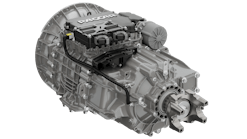Brenntag, the world's distributor of automotive grade urea, announced that it will provide diesel exhaust fluid (DEF) for selective catalytic reduction (SCR) engines throughout the United States and Canada. It already has more than 120 locations and currently is distributing some 150,000 gallons of DEF every day.
SCR is one of the technologies under development to meet the US Environmental Protection Agency's 2010 diesel emissions standards.
In simple terms with SCR, a fine mist of diesel exhaust fluid, also known as urea, is dosed into the exhaust to react and neutralize the nitrogen oxide molecules, explained the company's Alan Smith. A separate tank is fitted on the truck to house the urea, “a fluid that is harmless to the environmental. Urea already is widely distributed for many other industrial and agricultural needs.”
The rate of consumption for the fluid is 2% to 3% per gallon of diesel fuel, he said. It is estimated that one gallon of urea will take a truck about 250 miles.
If a truck runs out of urea, the engine will automatically re-rate, giving the driver a chance to pull off the road and refill. Otherwise, the engine will gradually shut down.
A major concern about the adoption of SCR is whether an infrastructure will be in place by 2010, Smith said.
Urea 2010 is Brenntag's national program to provide DEF availability by coordinating the necessary supply of urea, blending capabilities, and flexible packaging options.
The company has extensive experience with diesel exhaust fluid and has been a key player in developing the infrastructure in Europe “so we understands the complexity of a DEF start up, he said. “While North American operations have different challenges than in Europe, we don't see any of these to be ‘show stoppers.’”
Brenntag plans to stock DEF fluid that meets high ISO (International Organization for Standardization) quality standards throughout its network of facilities in North America. Urea will be available in 2.5-gallon containers, 55-gallon drums, 275-gallon intermediate bulk containers (IBC), and in bulk.








